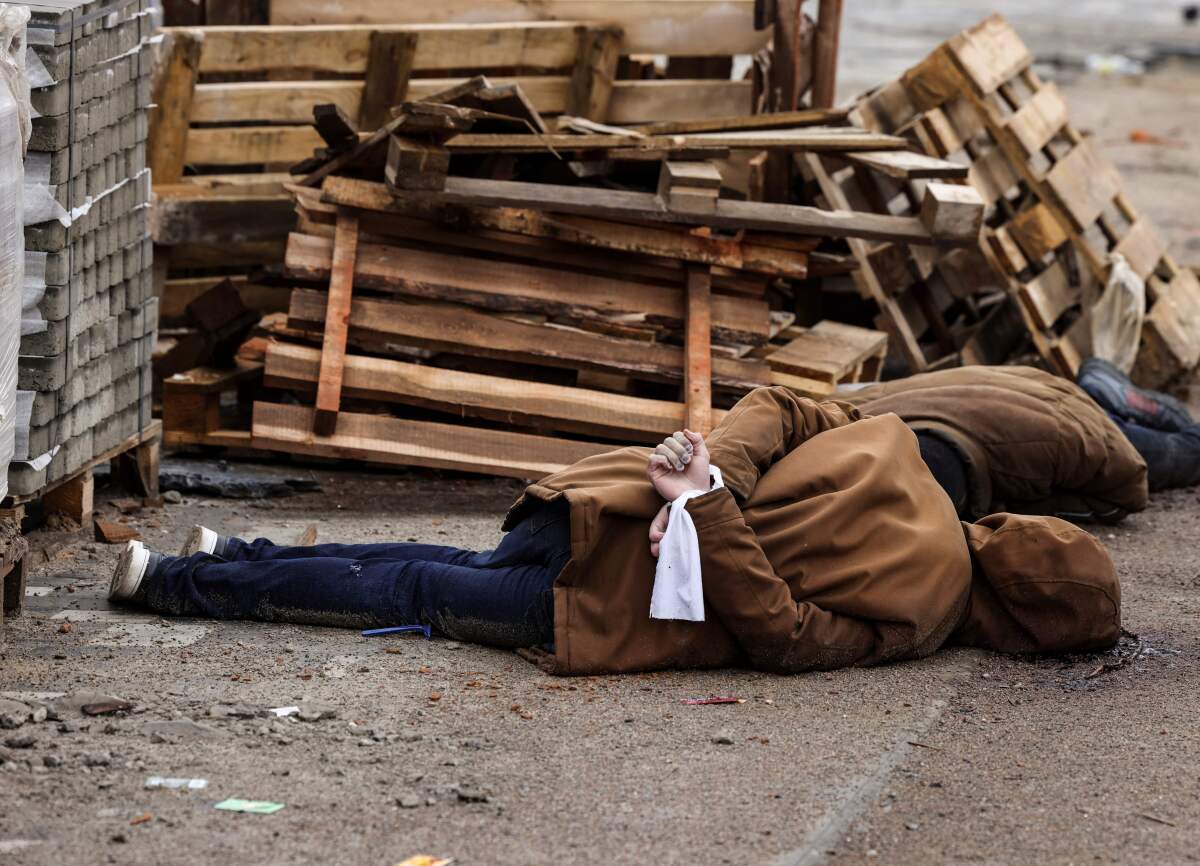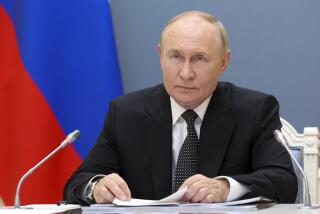Op-Ed: Lessons from the Soviets on how to hold Russia accountable for war crimes

- Share via
Evidence of Russian violence against Ukrainian civilians — murders, kidnappings and rape — continues to emerge on a daily basis. Each liberated locality adds to a grisly realization that a genocide might be taking place in the Russian-occupied Ukraine. Ukraine’s State Prosecutor’s Office has already started investigating crimes committed by Russian troops and the International Criminal Court might get involved as well.
The United Nations, Amnesty International and Human Rights Watch are also investigating Russian abuses. Investigations and criminal prosecution of individual perpetrators are important but insufficient. Full accountability — prosecution, reparations, and the creation of a historical record — requires an integrated effort that goes beyond law enforcement and involves historians, social scientists, forensic scientists, and other experts.
What Ukraine needs is a dedicated state commission to collect, systematize and analyze evidence of atrocities and other crimes committed during this war. Russian propaganda falsely presents the war as a fight against Nazism. Yet, ironically, Soviet efforts during World War II to uncover and prosecute Nazi crimes in German-occupied parts of the USSR can provide a useful blueprint to hold Russia accountable.
The Soviet Extraordinary State Commission, established in 1942 during the darkest days of World War II, included government officials, academics, investigators and forensic scientists. The commission sent representatives to liberated regions to supervise and verify the work of investigations being carried out by regional and local commissions. It employed photographers and filmmakers who documented crime scenes. The commission also included a small group of well-known writers and cultural figures, appointed to better communicate what was happening to the outside world.
The commission’s key goals were to record war crimes, make a case for reparations, mobilize domestic populations, shape international public opinion, prepare evidence for future trials, and establish the historical record. One of its strengths was its combination of forensic, legal and public relations expertise. Another advantage was that the local and regional commissions were made up of people from the region, not outsiders parachuting in, which facilitated better recording of the destruction of local cultural heritage. This approach allowed the commission quicker access to evidence from newly liberated areas and more immediate recollections by survivors.
While evidence gathering was localized, its aggregation and analysis were centralized. Information gathered at the local level was reviewed and compiled at the regional level, and then sent on to Moscow. The commission was then able to use this evidence to put together a bigger picture of German crimes.
The commission operated under extremely difficult conditions but managed to compile thousands of accounts and produce numerous reports, 32 of which were used in the Nuremberg trials. Its analysis uncovered general patterns of Nazi atrocities and their similarity across regions. It established, for example, that the Nazis intentionally destroyed cultural artifacts and national treasures and deliberately targeted hospitals and educational institutions.
But the Soviet commission also demonstrated the potential dangers of a state-led approach to documenting war crimes. Its work was subject to oversight by the Soviet security apparatus, and its reputation and stature were put to the service of falsifying evidence and whitewashing Soviet crimes, most notably the Katyn massacre of more than 20,000 Polish military officers and other prisoners of war. The commission issued a report that blamed the Nazis for that crime.
A dedicated Ukrainian state commission should draw on lessons from the Soviet experience and go beyond them. With many Ukrainians now displaced, comprehensive data gathering would need to span borders and could bring in members of the international community. Holocaust and genocide oral history archives in the West already have established procedures for interviewing survivors and witnesses as well as trained Russian-speaking interviewers who might assist in data collection. Scholars and prosecutors ask different questions and take different approaches to data analysis. Their efforts and skills should be used in tandem to provide as complete a picture as possible.
The Soviet experience also shows the need to avoid politicizing the prosecution of war criminals and distorting the historical record. Any commission established by the Ukrainian government must be transparent and free of political inference. It should include Ukrainian and international investigators and scholars. The commission’s charter should provide guarantees for academic freedom, impartiality and the ability to investigate any crimes, even those committed by Ukrainian soldiers. Scholars participating in this effort should work pro bono to avoid any suspicion of financial interest with freedom to publicly express their opinion.
We have no time to waste. As days pass by, evidence gets lost, recollections become imprecise and victims scatter or disappear. Scholars can’t wait until law enforcement completes their work, and investigators will not get the full picture without scholars’ input. Accountability goes beyond criminal prosecution — also at stake is the judgment of history. Victims of Russian violence deserve it.
Francine Hirsch is a professor of history at the University of Wisconsin-Madison and the author of “Soviet Judgment at Nuremberg.” Eugene Finkel is an associate professor of international affairs at Johns Hopkins University and the author of “Ordinary Jews: Choice and Survival during the Holocaust.”
More to Read
A cure for the common opinion
Get thought-provoking perspectives with our weekly newsletter.
You may occasionally receive promotional content from the Los Angeles Times.










